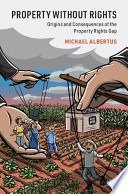
Property without rights :origins and consequences of the property rights gap
Major land reform programs have reallocated property in more than one-third of the world's countries in the last century and impacted over one billion people. But only rarely have these programs granted beneficiaries complete property rights. Why is this the case, and what are the consequences? This book draws on wide-ranging original data and charts new conceptual terrain to reveal the political origins of the property rights gap. It shows that land reform programs are most often implemented by authoritarian governments who deliberately withhold property rights from beneficiaries. In so doing, governments generate coercive leverage over rural populations and exert social control. This is politically advantageous to ruling governments but it has negative development consequences: it slows economic growth, productivity, and urbanization and it exacerbates inequality. The book also examines the conditions under which subsequent governments close property rights gaps, usually as a result of democratization or foreign pressure.
*Provides a new theory of why governments generate, maintain, and close property rights gaps
*Illustrates the economic, social, and political consequences of a lack of property rights that affects millions of people
*Presents data on countries throughout the world since 1900, spanning Latin America to parts of Europe and China
Cambridge University Press
Cambridge UK; New York
